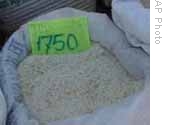VOA慢速英语-Agriculture Report - Reports of Gains Bring Attentio
搜索关注在线英语听力室公众号:tingroom,领取免费英语资料大礼包。
(单词翻译)
Supporters say the System of Rice Intensification1 can double productivity of irrigated2 rice. But others say there is no proof that S.R.I. is better than the best of conventional methods. Transcript3 of radio broadcast:
07 July 2008
This is the VOA Special English Agriculture Report.
Some farmers of irrigated rice in Asia, Africa and the Americas are using a production method called S.R.I. S.R.I. is short for the System of Rice Intensification. It does not require new seeds. It only requires changes in the ways that rice farmers manage plants, soil, water and nutrients4.
S.R.I. is short for the System of Rice Intensification. It does not require new seeds. It only requires changes in the ways that rice farmers manage plants, soil, water and nutrients4.
With S.R.I, farmers use fewer seeds and transplant them earlier than usual. Leaving more room between plants lets the roots and leaves spread more. Farmers also use less water. They keep the fields moist but do not continuously flood them. The use of chemical fertilizer is also reduced or even eliminated.
Norman Uphoff is a big supporter of the System of Rice Intensification. He was a professor of government and international agriculture at Cornell University in Ithaca, New York. He retired5 but still works from an office there to bring attention to the system.
A French priest, Father Henri de Laulanie, developed S.R.I. in Madagascar in the nineteen eighties. Norman Uphoff learned about it fifteen years ago while working there. He led field trials for the system for three years.
He says it usually doubles productivity. But during that time in Madagascar, it produced an average of eight tons per hectare. That was four times the usual average. In the late nineteen nineties, Professor Uphoff began trying to spread the word about S.R.I.
Supporters say there have been reports from many areas of large increases in productivity and profits. But not everyone is persuaded.
Kenneth Cassman is an agricultural expert at the University of Nebraska at Lincoln. In his words, "There is no strong evidence that the S.R.I. is more effective than the best of conventional rice-growing methods."
Kenneth Cassman notes that productivity in irrigated rice fields has been slowing, or stagnating6, for years. He says there should be more research into the problems and how to solve them.
But Norman Uphoff says he looks forward to more field trials next year which he believes will confirm the effectiveness of S.R.I.
The World Bank says farmers using the system in India's Tamil Nadu State are harvesting forty to eighty percent more rice than before. They report using eighty-five percent less seed and saving thirty-two percent on water usage.
And that's the VOA Special English Agriculture Report, written by Jerilyn Watson. For a link to the S.R.I. home page at Cornell, go to voaspecialenglish.com. I'm Steve Ember.
 收听单词发音
收听单词发音 




